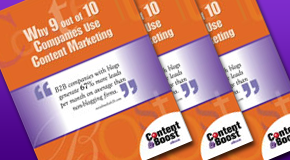From case studies to surveys to white papers to blogs and everything in between, there’s certainly no shortage of mediums you can use to meet your content marketing goals. In fact, you have so many options at your disposal that at the end of the day, it might be hard to choose which vehicles will be the most effective.
So which type of content makes the most sense for your business? Well, the needs of every business are different, so unfortunately there’s no cookie-cutter approach you can take when it comes to content creation.

Still, it’s worth considering what other executives are doing to see how your strategies compare to those of your competitors. MarketingCharts.com recently surveyed 500 global business leaders, asking them which three forms of content, from a list of 20 options, were the most helpful to meeting their goals:
- 71 percent said news articles were the most important
- 51 percent chose research reports or special reports
- 27 percent indicated white papers or briefing papers
- 19 percent selected newsletters
- 13 percent picked social media
What do those numbers mean to you? As you begin crafting your content creation strategies, it’s important that you assess your audience. How do they communicate? What’s important to them? You have to thoroughly plan out your approach and what market need you’re addressing. Otherwise, you risk becoming irrelevant—quickly.
Before you figure out which kinds of vehicles make the most sense for your brand, you need to take a step back and figure out what goals you’re trying to accomplish. Comprehensive content marketing strategies will include content that entertains, content that persuades, content that educates and, of course, content that converts.
So which mediums are right for you? A robust content marketing strategy will include a variety of different vehicles, including blog posts, articles, white papers, case studies, webinars and infographics. The more mediums you try, the more data you’ll be able to collect to see what’s working and what isn’t. You can then make adjustments accordingly.
Sound overwhelming? The good news is that you don’t necessarily need to make all of these decisions on your own. By deciding to leverage the services of a content strategy vendor, you’re taking some of the hard work off your plate and instead trusting those tasks to a team of professionals who will advise you as to what kinds of content make the most sense for your particular situation.
It’s important to remain calm: You don’t have to go it alone.















